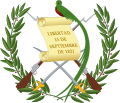This article includes a list of references, related reading, or external links, but its sources remain unclear because it lacks inline citations .(October 2025) |
| This article is part of a series on |
| Politics of Guatemala |
|---|
 |
Parliamentary elections were held in Guatemala between 26 and 28 November 1948 in order to elect half the seats in Congress. The National Renovation Party-Revolutionary Action Party alliance won the most seats, but the Popular Liberation Front remained the largest party.